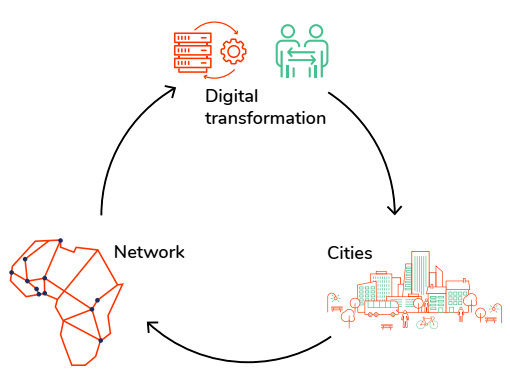Urban growth and digital transformation
Why a city network for digital transformation?
ASToN, as a city network for digital transformation, responds to a context of rapid urbanisation, a rise in complex and systemic urban problems, and opportunities to use digital transformation to address these issues. The idea of a network of cities collaborating around digital transformation came about as an extension of the work done with URBACT, ANRU and the AFD on smart cities and city collaborative networks. The objective of ASToN is to improve the capacity of African local authorities to lead digital transformation and innovation processes for their territory.

With over half the world’s population now living in urban areas, and with Africa being home to the 10 fastest growing cities in the world, African cities have a vital role to play in creating sustainable and inclusive futures.
The fact that by 2030, Africa will host 6 of the world’s 41 megacities offers great opportunity and huge challenge at the same time.
The rapid pace of global technological change is opening up new economic and social relationships within Africa. Digital technology is increasing in importance, especially in the face of demographic change and investment in digital infrastructure that are connecting more individuals to the internet. In recent years, digital technology has been a powerful force in how we work, travel, trade, communicate and consume, in what is an increasingly globalised world. Digital technologies have the potential to increase economic output, improve public services, encourage citizen participation, and are being used to help tackle some of society’s biggest challenges.
What does this mean for city authorities? The ability of a local authority to mobilise digital tools and data for the benefit of their territory will influence how they are able to design policies and deliver public services. Building digital infrastructure, skills and new ways of working are important in being able to structure, monitor and evaluate government projects in radically different ways. Digital transformation of a local authority or urban service, if it is pointed at the development of new, relevant and fruitful digital uses in the local area, can contribute towards the UN Sustainable Development Goals (SDGs).


